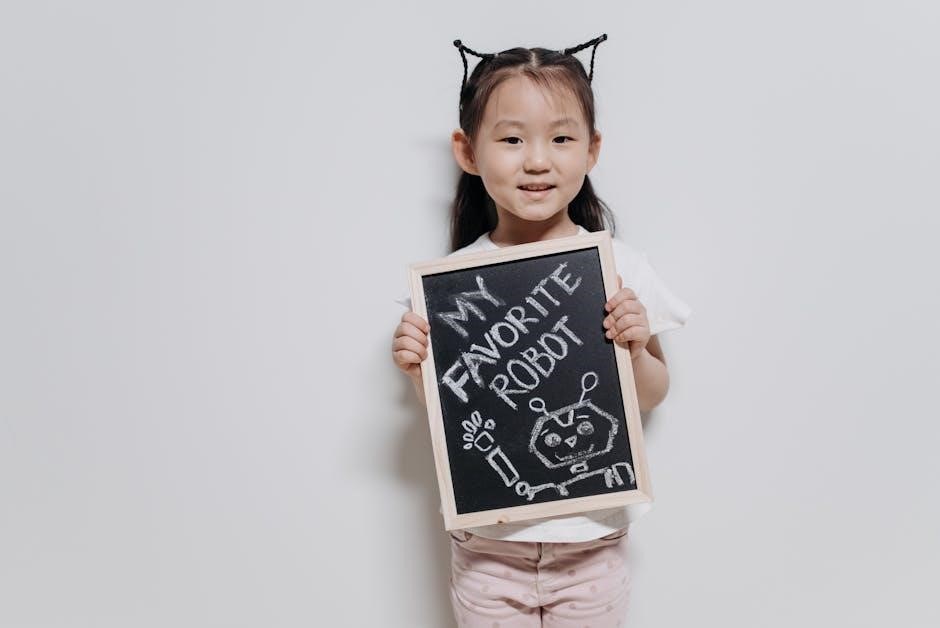
Chapter 6 of My Childhood Friends Guide delves into the complex dynamics between the narrator, a D-Class Guide, and Jung Taewon, a childhood friend with extraordinary abilities.
1.1 Overview of the Chapter’s Central Plot
Chapter 6 focuses on the narrator’s struggle to guide Jung Taewon, a childhood friend turned powerful Sentinel, whose unpredictable behavior escalates into a rampage. The chapter explores the necessity of physical contact for control and the emotional turmoil it triggers, highlighting the narrator’s dilemma in balancing friendship with duty amidst rising tensions and unresolved past conflicts.
1.2 Setting the Stage for Jung Taewon’s Role
Jung Taewon, a childhood friend of the narrator, emerges as a central figure in Chapter 6, now a powerful yet unpredictable Sentinel. His rampage underscores the challenges of guiding him, while flashbacks reveal their shared past, highlighting unresolved tensions and the emotional weight of their evolving relationship.

The Relationship Between the Narrator and Jung Taewon
The narrator and Jung Taewon share a childhood bond turned complex, with emotional tension and power imbalance, as Taewon’s abilities as an A-Class Sentinel dominate their dynamic.
2;1 The Complexity of Their Childhood Bond
The bond between the narrator and Jung Taewon is rooted in childhood memories, evolving into a intricate mix of trust, tension, and unspoken emotions. Their relationship, once innocent, now carries deeper undertones, with Taewon’s unpredictable nature and the narrator’s reliance on him creating a dynamic filled with challenges and quiet misunderstandings. This connection underscores the chapter’s emotional depth and complexity.
2.2 The Power Dynamics in Their Relationship
The relationship between the narrator and Jung Taewon is marked by shifting power dynamics. As a D-Class Guide, the narrator relies on Taewon’s strength, yet struggles to maintain control. Taewon’s unpredictable behavior and latent power create tension, while the narrator’s growing influence over him adds complexity, blurring the lines between dependency and authority in their evolving bond.

The Role of Physical Contact in Guiding
Physical contact plays a vital role in guiding, serving as a necessary tool for the narrator to maintain control and align Jung Taewon’s immense and unpredictable power effectively.
3.1 The Necessity of Physical Interaction
Physical interaction is vital for guiding, as it allows the narrator to align their energy with Jung Taewon, enhancing their abilities and maintaining control. This tactile connection ensures stability, preventing chaotic outbursts while fostering trust and synchronization. For a D-Class Guide, such contact is crucial, especially with an A-Class Sentinel like Jung Taewon, whose unpredictable power demands constant oversight and precise direction to avoid catastrophe.
3.2 The Challenges of Maintaining Control
Maintaining control over Jung Taewon is fraught with challenges, as his immense power and volatile nature often clash with the narrator’s D-Class limitations. The strain of guiding such an unpredictable Sentinel creates tension, while Taewon’s occasional resistance tests the narrator’s resolve. The necessity of physical contact adds another layer of complexity, as it requires precise balance to avoid losing grip on the situation entirely.

The Involvement of Twin Brothers Zheng Jia and Zheng Yan
Zheng Jia and Zheng Yan, A-Class Sentinels, play pivotal roles in enhancing the narrator’s abilities, offering unwavering support and creating a unique dynamic in the story.
4.1 Their Contribution to the Narrator’s Growth
Zheng Jia and Zheng Yan, as A-Class Sentinels, significantly enhance the narrator’s abilities through their unwavering support. Their bond, rooted in childhood, strengthens the narrator’s resolve and skill, enabling him to navigate challenges more effectively while fostering mutual trust and understanding.
4.2 The Unique Dynamics of Twin Siblings
Zheng Jia and Zheng Yan’s twin bond adds depth to the narrator’s journey, blending protectiveness with playful rivalry. Their synchronized abilities enhance the narrator’s strength, while their affectionate yet intense relationship creates a dynamic that is both heartwarming and essential to the story’s progression, highlighting their irreplaceable role in his life.

The Struggles of a D-Class Guide
As a D-Class Guide, Qiao Yang faces immense challenges, struggling to control A-Class Sentinels while relying on physical contact to enhance his abilities, a double-edged necessity.
5.1 The Limitations of the Narrator’s Abilities
As a D-Class Guide, Qiao Yang’s abilities are inherently limited, relying on physical contact with his childhood friends to enhance his power. This dependency creates vulnerability, as maintaining control over A-Class Sentinels like Jung Taewon becomes increasingly challenging, highlighting the stark contrast between his class and the formidable strength of those he guides.
5.2 The Pressure of Guiding A-Class Sentinels
Guiding A-Class Sentinels like Zheng Jia and Zheng Yan places immense pressure on Qiao Yang, a D-Class Guide. His reliance on physical contact to enhance his abilities underscores the fragility of his control. Balancing their strength while maintaining trust proves daunting, as any misstep could lead to unpredictable consequences, heightening the strain on his role as a guide and a friend.

The Evolution of the Narrator’s Bond with Childhood Friends
The narrator’s relationship with childhood friends evolves from simple camaraderie to complex adult dynamics, shaped by shared experiences and mutual dependence, highlighting growth and underlying tensions.
6.1 From Innocence to Complicated Adult Relationships
The narrator’s bond with childhood friends transitions from carefree innocence to intricate adult dynamics, marked by shared experiences and mutual dependence. Nostalgia for simpler times clashes with the realities of power imbalances and newfound responsibilities, revealing deeper emotional layers and underlying tensions in their relationships. This evolution highlights the challenges of maintaining connections amid personal and societal pressures.
6.2 The Influence of Shared Experiences
Shared experiences forge deep emotional bonds, fostering trust and loyalty between the narrator and childhood friends. These moments of unity shape their decisions and interactions, creating a foundation of mutual understanding. The influence of shared experiences becomes a guiding force, navigating them through challenges and strengthening their connection despite the complexities of adulthood.
Themes Explored in Chapter 6
Chapter 6 explores themes of control, dependence, and the balance between nostalgia and adulthood, highlighting the complexities of guiding powerful childhood friends.
7.1 The Balance Between Nostalgia and Adulthood
Chapter 6 intricately explores the tension between nostalgic memories of childhood and the harsh realities of adulthood. The narrator reflects on the simplicity of past bonds while grappling with the complexities of guiding powerful friends, emphasizing the emotional conflict of preserving innocence amid growing responsibilities and unforeseen challenges.
7.2 The Consequences of Dependence and Power
The chapter delves into the emotional and psychological consequences of dependence and power, highlighting the narrator’s struggle with relying on childhood friends for strength. This dynamic creates tension, as the narrator grapples with maintaining autonomy while being emotionally and professionally indebted. The strain on relationships and the fear of losing control underscore the risks of power imbalances.

The Climax of the Chapter
The chapter reaches its peak as Jung Taewon’s rampage intensifies, forcing the narrator into a critical decision that tests loyalty, control, and the future of their bond.
8.1 The Critical Moment of Jung Taewon’s Rampage
Jung Taewon’s rampage reaches a boiling point, with his unpredictable power surging out of control. The narrator, desperate to prevent catastrophe, must confront the emotional and physical challenges of guiding him. This intense moment highlights the fragile balance between their bond and the danger posed by Taewon’s unchecked abilities, pushing their relationship to its limits.
8.2 The Narrator’s Dilemma and Decision-Making
The narrator faces a moral dilemma during Jung Taewon’s rampage, torn between protecting others and preserving their bond. The decision to intervene risks damaging their trust but is crucial to prevent harm. This moment underscores the narrator’s struggle with responsibility and the delicate balance of power in their relationship.
The Aftermath and Its Implications
The events’ aftermath leaves emotional tolls and strained relationships, while revealing deeper truths about dependence and power, reshaping the narrator’s understanding of their role and future dynamics.
9.1 The Immediate Consequences of the Events
The aftermath of Jung Taewon’s rampage leaves strained dynamics between the narrator and their childhood friends. Physical contact, once a necessity, now feels fraught with tension, while the narrator grapples with the emotional weight of guiding such a powerful Sentinel. The immediate consequences highlight the fragility of control and the unpredictable nature of their bond, setting the stage for unresolved conflicts and looming challenges ahead.
9.2 The Long-Term Impact on Relationships
The events of Chapter 6 leave lasting scars on the narrator’s relationships with childhood friends, particularly Jung Taewon. Trust is tested, and the dynamics shift as adulthood complicates once-innocent bonds. The narrator’s role as a guide deepens emotional connections but also introduces tension, reshaping how friends perceive one another. Shared experiences foster resilience, yet the strain of guiding powerful Sentinels looms, hinting at future challenges and evolving dependencies.
Chapter 6 concludes with reflections on the narrator’s growth and the fragile balance of relationships, while hinting at future challenges and the evolving dynamics with childhood friends.
10.1 Reflection on the Chapter’s Key Lessons
Chapter 6 underscores the complexity of relationships, highlighting how childhood bonds evolve into intricate adult dynamics. The narrator’s reliance on friends for empowerment reveals the delicate balance between dependence and growth. Themes of nostalgia and responsibility intertwine, showcasing the protagonist’s struggle to navigate power dynamics and personal identity. These lessons set the stage for future challenges, emphasizing the enduring impact of shared experiences.
10.2 Teasers for the Upcoming Challenges
Future chapters hint at escalating tensions as the narrator faces increased responsibility and moral dilemmas. The twin brothers’ affection may complicate alliances, while Jung Taewon’s volatile nature teases impending conflicts. The protagonist’s reliance on childhood bonds will be tested, and the stakes of guiding A-Class Sentinels will demand difficult choices, setting the stage for a transformative journey.